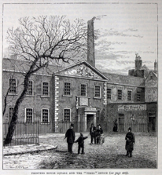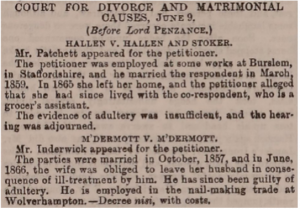TheGenealogist launches fully searchable copies of The Times Newspaper, to join its ever-growing Newspapers and Magazines Collection.
The Times was originally founded by publisher John Walter on the 1st of January 1785 as The Daily Universal Register, then exactly three years later, adopted its new name by which it is still known today.
The latest release sees 3,129 editions from the 1870s decade join the many other newspaper publications already available to search on TheGenealogist. Further decades are to be released in the coming months of this famous name-rich newspaper of record.

Printing house square and The Times office
The Times Newspaper, or ‘The Thunderer’, as it was nicknamed, like many other newspapers carried Birth, Marriage and Death announcements and so is a great resource for finding details of our ancestors and where they lived. Broadening our knowledge on the background details of our ancestor’s lives helps researchers to get a feeling for the period in which they lived as the articles are contemporary to their times.
That being said, discovering our forebears recorded in this newspaper may surprise some researchers. Inclusion in its pages may be because our ancestor was the victim or a witness to a crime. They may have worked as a police officer, lawyer or been a member of the court that had been a part of a legal case reported on by The Times Newspaper.
Some ancestors may have warranted their name in print in this hallowed publication on being newly qualified and joining a professional body, for example The Royal College of Surgeons. But it is not just the great and the good that appear in The Times Newspaper, as all sorts appear in its pages. For example, the parties to divorce cases are ordinary people from across the country.

Court for divorce clipping
You can read who was the petitioner, respondent and co-respondent, giving a researcher some useful information. Often included is the county in which the couple had lived and an occupation for the man. For example, in the edition for Friday the 10th June 1870 is a case where a man’s wife had left home to live with another. We discover that the petitioner was employed “at some works at Burslem, in Staffordshire” while the co-respondent in the case was a grocer’s assistant.
Image Source:
- The Times Newspaper: https://www.thegenealogist.co.uk/press-release/2022/the-times-newspaper-historic-collection-launches-on-thegenealogist/
- Court for divorce clipping: https://www.thegenealogist.co.uk/press-release/2022/the-times-newspaper-historic-collection-launches-on-thegenealogist/
- Photo by Hayden Walker: Unsplash





